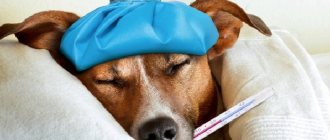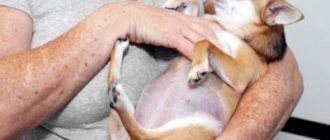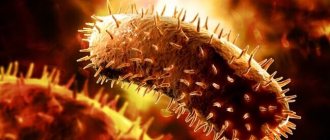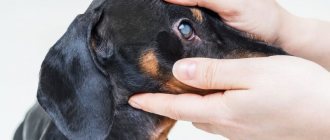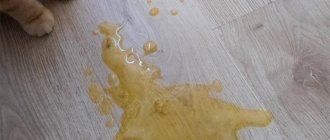Causes of diarrhea
Modern vaccines can only cause increased drowsiness and depression for 1-3 days.
Only a veterinarian can answer why a dog is diarrhea after a vaccine. Each dog receives the vaccine individually. Most often, diarrhea appears in those dogs that previously suffered from dysbiosis. Diarrhea occurs if the dehemeltization procedure was not carried out or the dog was sick. The vaccine affects the intestinal microflora. If beneficial bacteria are weakened, they die. The intestines are colonized by pathogenic microorganisms that irritate its walls. As a result, the body's defense reaction in the form of diarrhea is triggered.
What complications can dogs have after rabies vaccination?
Dogs usually tolerate vaccination well; modern drugs can cause side symptoms in very rare cases. But this does not mean that the administered vaccine, carried out according to the rules, cannot cause complications in the animal.
Recommendation: reactions to vaccination appear 15 to 25 minutes after its administration or after 2–3 days. Everything depends only on the individual physiological characteristics of the body. Owners must be attentive and monitor its behavior to avoid complications after vaccination against rabies in dogs, in order to protect it from undesirable consequences.
Possible consequences and complications after vaccination:
- Allergic reaction, skin rashes, itching;
- The dog is vomiting after vaccination, nausea, she feels bad;
- Decreased activity, lethargic, does not eat;
- A lump, swelling or abscess appears at the injection site;
- Convulsions, impaired coordination, muscle spasms;
- Frequent urination, involuntary diarrhea, or fever.
In addition to the above symptoms, there are other uncharacteristic symptoms - breathing is disrupted and even the heart rate changes. The most dangerous complication after vaccination is anaphylactic shock, and in this case it is strongly recommended to call emergency help so that the dog does not die from suffocation.
Miniature breed puppies may develop an autoimmune disease after vaccination. In this condition, puppies cannot resist a dangerous infection; with chronic damage to the kidneys and liver, there is very little chance of recovery and life.
The intensity of side effects depends only on the age and characteristics of the body itself. In small puppies it is more pronounced in relation to adult dogs.
Symptoms that appear on the first day after vaccination can only be explained by individual intolerance to the components contained in the vaccine when the dog has already been infected with this dangerous virus.
Post-vaccination allergic reactions can occur to vaccines that have already expired. It is strongly recommended that you carefully study the annotation before you start grafting yourself. Be sure to follow all hygiene and safety rules when working with medications.
Symptoms
When a dog's body fights the injected virus, a heavy load falls on the lymphatic system, kidneys and liver. If the dog’s body was weakened before vaccination, it may not cope and the process of intoxication will begin. It manifests itself in the form of fever, vomiting, diarrhea and weakness.
Diarrhea may not be related to the vaccine. Symptoms of diarrhea not associated with vaccination include:
- high or low temperature may be a consequence of the development of viral diseases: eneritis or plague;
- the pet is lethargic, this may indicate that he has food poisoning or an infection;
- loss of appetite, blood in the stool indicates poor food;
- If the dog has diarrhea and coughs and mucus comes out of its nose, it could be distemper or rhinotracheitis.
Symptoms that should not cause concern include:
- swelling or lump at the injection site. It should resolve within a month. Only some vaccines cause this reaction. If the lump does not grow and does not bother the dog, then there is no need to worry;
- pain at the injection site for a maximum of three days;
- lethargic condition and increase in temperature to 39 degrees;
- one-time vomiting;
- The dog skipped one meal.
Possible complications after vaccination in dogs
Unfortunately, even proper preparation for vaccination in some cases does not protect against side effects that greatly worry owners. Therefore, in order not to panic and to provide your pet with competent assistance in a timely manner, you need to know the possible complications after vaccination in dogs.
Complications that do not require specialist help
There is no need to be concerned if, after receiving the rabies vaccine, your pet develops the following symptoms:
- lethargy lasting no more than a day;
- one-time refusal to eat;
- short-term increase in temperature to no more than 39.5©;
- one-time digestive upset in the form of vomiting or diarrhea;
- formation at the injection site of a painless swelling or small compaction that does not cause discomfort when pressed.
what to do the dog is limping the paw is swollen
Why is the dog limping?
Lameness is any impairment of gait function in one or more limbs. That is, a change in gait, which is expressed by asymmetry in the movement of the limbs due to various dysfunctions of the musculoskeletal system. Lameness is not a diagnosis, but a symptom. But there are many reasons for lameness. These are traumatic damage to the joint and ligamentous apparatus (bruises, sprains, dislocations, fractures, etc.), diseases of the peripheral nerves and spinal cord (paresis, paralysis), circulatory disorders in the extremities (thrombosis), neoplastic formations (bone tumors - osteosarcomas, muscles - fibroids, etc.), genetic diseases (hip dysplasia (large dog breeds - Rottweilers, Labradors, St. Bernards, etc.), dysplasia of the knee joint with dislocation of the knee cap (Toy Terrier, Spitz, Griffon), avascular necrosis of the head hips (Legg-Peters disease), pathological fractures in juvenile osteopathy), inflammatory processes (myositis, osteomyelitis, etc.), vitamin D deficiency (rickets).
Preparing for vaccination
There are certain rules that must be followed before vaccination to avoid negative manifestations:
- The animal must be healthy at the time of vaccination. If a dog has some kind of disease, it must first be cured. Three days before the vaccine is administered, the animal’s temperature must be monitored. The readings are normal - 37.5 - 39 degrees.
- Observe the dog's appetite and activity.
- If there is a possibility of contracting the disease for which the vaccine is being given, the dog must be isolated from others. The animal is vaccinated after two months, when all signs of the disease have disappeared. If you get vaccinated when the virus is present in the body, this is fraught with negative side effects.
- Puppies should have their blood tested before receiving the vaccine.
- If there are worms, they must be destroyed by dehemeltization procedure. Worms secrete many substances that suppress the immune system. When a dog has worms, after vaccination there may be negative consequences, including diarrhea. Therefore, before vaccination, you need to donate feces.
- You should make sure that your dog does not have lice or fleas.
- When puppies start teething - 4-5 months - they cannot be vaccinated.
- It should be taken into account that stress on the way to and from the hospital affects the occurrence of side effects. After stress, the dog becomes weak, which worsens the condition after vaccination. If possible, it is better to call a veterinarian at home.
- Before vaccination, you do not need to walk your dog in public places. Places with large concentrations of dogs are especially dangerous. And to relieve the need, you can organize a special place.
- Hygiene rules must be observed. The dog should not be allowed near dirty shoes, clothes, or outdoor items.
After the vaccine you must:
- Monitor your dog for signs of allergies for several hours: shortness of breath, weakness, excessive salivation, pale mucous membranes.
- Limit the dog from stressful conditions: change of place, transportation, change of food.
- Do not wash your pet and allow it to become overheated or hypothermic.
- Avoid strenuous physical activity.
Immunity is formed after vaccination after two weeks.
Important! From the moment of breastfeeding until vaccination, the puppy has no immunity. It is very vulnerable to the environment. Almost all viruses are transmitted by airborne droplets.
Vomiting in a puppy: possible causes and first aid for a pet
Vomiting in a puppy can frighten any dog owner, especially if the vomiting is strong and frequent.
You can understand why a puppy is vomiting only by carefully observing your four-legged friend. If vomiting is one-time and occurs no more than 1-2 times a week, there is no reason to worry, but when the baby vomits every day, you need the help of a veterinarian, otherwise there is a high risk of the pet’s death. Vomiting is understood as a natural reaction of the body to the action of irritating factors. Various poisons, toxins or foreign objects entering the body can cause vomiting in the puppy, which causes the food in the stomach to be ejected through the mouth. In this way, the pet’s body tries to cleanse itself of harmful substances.
Vomiting, which occurs in rare cases, does not pose a threat to the baby’s life, but if gag reflexes occur more often and are accompanied by additional symptoms (impurities of blood, bile, etc.), the dog is immediately shown to a doctor. The puppy’s body is not yet strong enough, and frequent vomiting will quickly lead to dehydration and then the death of the baby.
Causes of vomiting in puppies
The occurrence of nausea is influenced by many factors. The most common reasons why a puppy vomits are:
- overfeeding the dog;
- long stay of the animal in a stuffy room or in the sun;
- diseases of an infectious nature, accompanied by high body temperature and general intoxication of the body;
- the presence of helminths in the body;
- stress associated with the transition to another type of food, weaning the puppy from its mother;
- poisoning with spoiled food, medications, chemicals;
- allergy;
- pathologies of the central nervous system;
- diseases of the digestive tract;
- entry of foreign objects into the body.
Pathological vomiting
The condition of vomiting itself is not considered a disease, but is a symptom of a pathology occurring in the body, both completely harmless to the health of the four-legged friend, and posing a mortal threat to life.
Vomiting blood
Bloody spots in the vomit are a very dangerous symptom for the baby’s life, because the appearance of liquid and bright red blood in the vomit indicates bleeding of the larynx, oral cavity or esophagus. Brown masses can signal kidney failure, liver pathology, stomach injuries from bone fragments or sharp foreign objects swallowed by the baby.
In addition, vomiting blood in a puppy is considered a consequence of intoxication with zoocoumarins and heavy metals. Vomiting blood can also be caused by severe infections such as enteritis, leptospirosis, or viral hepatitis.
Vomit with bile
It is impossible to independently diagnose why a puppy is vomiting bile, because yellow vomit is a symptom of most diseases or disorders occurring in the body of a four-legged friend. Vomiting bile in a puppy is a sign of:
- helminthic infestation;
- chronic stomach diseases (ulcers, gastritis);
- severe liver infections;
- result of overfeeding the dog.
Vomiting and diarrhea
Often, vomiting occurs along with intestinal upset (diarrhea) and is accompanied by elevated body temperature and severe dehydration.
Such signs indicate severe poisoning or infection with dangerous infections. The owner of the animal should under no circumstances hesitate and wait for the problem to be resolved independently.
It should be remembered that vomiting and diarrhea in a puppy quickly dehydrates the body, which can result in death.
Vomiting, diarrhea and refusal to eat
When the puppy does not eat, diarrhea and vomiting do not stop for a long time, and the body temperature rises, this may be the result of poisoning or infection with an infectious disease. In this condition, it is prohibited to force feed your pet. The animal is closely monitored, and if the next day the puppy does not eat or the vomiting does not stop, the pet is urgently taken to a veterinary hospital.
Vomiting after vaccination
Often, after vaccination, a puppy may vomit suddenly. The owner should monitor the pet’s condition, and if the vomiting does not stop the next day, consult a doctor.
Reflex vomiting
Nausea is not always a sign of any disease or disorder. In order to distinguish reflex vomiting from pathological vomiting, you should carefully monitor the pet’s condition: pay attention to the nature and frequency of vomiting, find out the causes of vomiting in puppies, and additional symptoms.
Vomiting with foam
When a puppy vomits foam, the owners begin to panic and worry greatly about the health of their four-legged pet. Most often, this is completely normal in dogs.
If your puppy has white vomit, this is mucus covering the walls of the stomach and protecting the muscular organ from the effects of hydrochloric acid.
When interacting with oxygen, mucus turns into foam and can sometimes leave the stomach through the oral cavity (most often this phenomenon is observed in the morning, when the animal is hungry).
Vomiting when eating grass
While walking your pet, you may notice that sometimes he reaches out to chew the grass, after which the four-legged pet begins to feel sick. You shouldn’t be afraid of this, because in this way the animal cleanses the stomach of harmful substances, but if your furry friend eats grass more often than he should, then he is experiencing an uncomfortable state.
The reason for regularly eating grass may be poisoning, poor quality food, or the presence of helminths in the body. This problem can be solved using simple steps: treatment is carried out against worms, and if the pet is fed low-quality products, the pet is transferred to a dietary and balanced diet.
Chocolate can make a dog vomit.
Vomiting after eating
Vomiting after eating in a puppy is not uncommon, because a small pet is often in a hurry to swallow food quickly. As a result, poorly chewed food may be regurgitated by the stomach. To avoid this situation, the baby should be fed soft food or special food for puppies, produced in the form of small granules. If your adult dog is vomiting, read here
Symptoms of poisoning
Severe vomiting in a Spitz puppy is always observed when poisoned by any toxic substances or poor-quality food. In addition to gagging, the following signs indicate intoxication:
- lethargy and weakness of the animal;
- the puppy is vomiting and does not eat anything;
- increased body temperature;
- painful condition in the abdominal area;
- limb spasms;
- discharge of blood from the anus, eyes or nose;
- the dog is diarrhea.
Bloody diarrhea and vomiting observed in a puppy may be symptoms of acute intoxication. But some types of poisoning are difficult to distinguish from infectious processes, so veterinary diagnosis will be required to prescribe the correct treatment.
First aid for a puppy vomiting
Vomiting is an uncontrolled natural process of cleansing the body, so you should never scold your pet for vomiting. For the same reason, you should not stop the urge on your own, otherwise harmful substances (poisons and toxins) cannot completely leave the baby’s body. What to do if your puppy vomits? Here's how you can help:
- If nausea in a shepherd puppy was provoked by a sharp transition from one food to another, you need to return to your usual diet. New food should be introduced gradually and no earlier than a week later the baby can be completely transferred to a new type of food.
- Follow a fasting diet for 24 hours. It is also not recommended to give water. To avoid dehydration, every 2 hours the puppy is given 2 teaspoons of water per 1 kg of the pet’s weight. After the baby has stopped vomiting, you can give your pet some wet food. You are allowed to return to your usual diet no earlier than after 2 days.
- If the puppy's vomiting and fever do not stop within several days, self-medication should not be done. The animal must be examined by a specialist.
What to do if your puppy has diarrhea and vomiting? In such cases, the animal must be urgently taken to the veterinarian, because this condition often indicates the development of severe infectious diseases.
Treatment
Only a veterinarian should prescribe treatment for vomiting in a puppy. Based on the reason, the doctor selects the following drugs:
- No-shpa - to relieve pain and cramps in the stomach;
- Smecta – removes poisons and toxins from the baby’s body;
- Metoclopramide - affects the vomiting center of the brain;
- Omez – reduces the production of hydrochloric acid.
Intravenous drips (glucose 40%, sodium chloride, ringer lock) help restore fluid loss in cases of severe dehydration.
It is unacceptable to treat with alternative medicine recipes, as well as to prescribe medications yourself and calculate the dosage; this will lead to severe complications and even the death of your four-legged friend.
Prevention
It is impossible to completely avoid the occurrence of nausea, but by following simple rules you can reduce the risk of its occurrence. First of all, you need to pay attention to feeding your pet. The puppy should be fed only high-quality and balanced food, avoid spicy, sweet and smoked foods. In addition, it is recommended to minimize the occurrence of stressful situations.
To prevent infection with infectious diseases and helminthic infestations, the animal must be regularly vaccinated and dewormed. To avoid poisoning by toxic substances, try to closely monitor your pet (do not allow him to pick up food on the street, hide medications and household chemicals).
Sudden onset of vomiting does not always indicate pathological processes in the pet’s body. But if the urge continues for a long time and is accompanied by additional symptoms, the animal in most cases requires the help of a veterinarian.
Source: https://otravilsya.com/zhivotnye/rvota-u-shhenka/
Why does this happen?
Only an experienced veterinarian-immunologist can give an exact answer in each specific case. Everything is too complicated, there are many dependencies on one or another type of vaccine. Everywhere it happens that one dog tolerates the vaccination perfectly, no difficulties arise. Again, his sibling may not respond well to the same vaccine from the same batch (or even from the same vial).
But! There are several important requirements that must be met before administering the vaccine.
The most important thing is that at this time your pet must be completely healthy . Of course, it may be unrealistic to guarantee the complete absence of chronic diseases, but it is still very desirable that during this period they are not in the acute stage! If your dog suddenly “woke up” to some old disease, its manifestations should be completely stopped before vaccination.
In cases where there is a possibility of contracting a disease for which a pet is vaccinated (distemper, for example), it is necessary to completely isolate it from the environment and other animals. Ideally, for this, the animal should be “confined” in a separate room . After the signs of the disease disappear, the animal is treated with hyperimmune serum, and after a couple of months, when the disease is definitely in the stage of stable remission, the vaccine is administered. Why and for what purpose are all these difficulties?
Before vaccination, rid your dog of worms!
This is exactly the nuance that almost all breeders constantly forget about. Remember that for the successful formation of an immune response, it is necessary to get rid of parasitic worms in your pet’s body (if they are there, of course). And this is no less important than if compared with stopping a newly manifested chronic disease. The fact is that worms secrete many substances that inhibit the action of the animal’s immune system. If the helminthic infestation is serious, the volume of these compounds becomes critical: normal immunity in such cases will physically no longer be able to form . Of course, in these same cases, the risk of side effects, including diarrhea, becomes higher than ever.
So before vaccination, a stool test is mandatory. If eggs or fragments of parasites are found there, you need to treat the dog with anthelmintic drugs. Moreover, this should be done at least twice. And vaccination can be carried out only after all eggs and other traces of the presence of parasites have completely disappeared from the animal’s feces. As in the previous case, if it is vital to vaccinate a pet as quickly as possible due to the threat of infection, the recipe is the same - first serum, and only then vaccination .
Treatment
First you need to contact your veterinarian. If diarrhea lasts less than a day, then this does not threaten the animal with anything dangerous. The dog must be limited in food and given water without restrictions. To soothe an irritated intestine, it is worth using enveloping agents and absorbents. The most popular drugs are Smecta and Enterosgel. The sorbing and enveloping particles included in the preparations will soothe the intestines and remove toxic substances.
Important! If your dog starts vomiting or diarrhea continues for more than 12 hours and the diarrhea gets worse, you should immediately go to the doctor.
Usually, dogs recover quickly after an unsuccessful vaccination and do not require additional treatment.
Diarrhea after vaccination, what to do?
The instructions for almost all vaccines contain a substantial list of side effects. Manufacturers rarely provide statistics because they simply don’t have them. It has been empirically determined that the most common side effect of vaccination is a slight and temporary increase in body temperature. Due to poor health, the puppy may refuse to eat or be reluctant to eat. Again, due to weakness, the baby may sleep more or refuse to play.
The second most common side effects are diarrhea or vomiting. Most often, this effect after vaccination is observed in puppies that already suffered from a mild form of dysbacteriosis. Prerequisites for microflora disturbances can be observed in animals that lived on the street or were artificially fed.
After the introduction of a weakened virus, the blow falls not only on the immune system, but also on the intestinal microflora. If colonies of friendly bacteria are few or weakened, they die. Therefore, the intestines are quickly populated by pathogenic flora. Unfriendly bacteria irritate the intestinal walls, which triggers a protective reaction in the form of increased mucus secretion (diarrhea).
During the fight of the immune system against weakened virus cells, dead microorganisms are filtered out by the lymphatic system, kidneys and liver. If the dog’s body was weakened before vaccination, the cleaning system may not be able to cope with the amount of “work”. The puppy develops intoxication, which is expressed by symptoms similar to food poisoning: vomiting, diarrhea, rapid breathing, weakness, apathy.
Tip: to distinguish food poisoning from intoxication after vaccination, the puppy needs to measure its temperature. In case of poisoning, the temperature most often decreases; in case of intoxication after vaccination, it rises.
How to help a puppy who has diarrhea after vaccination? The problem is that you know exactly the reason, but you cannot influence it. The only reasonable way to help is supportive therapy and seeing a doctor.
To reduce irritation of the intestinal mucous membranes, it is necessary to use enveloping agents and absorbents. Smecta and Enterosgel are considered universal remedies.
With diarrhea, for whatever reason it develops, pathogenic microflora multiplies in the intestines and toxins are present. Sorbents bind toxic substances, and enveloping particles cover the mucous membrane to calm them.
Important! Self-treatment can be continued for no more than 12 hours. If, despite all the measures taken, diarrhea becomes stronger, bowel movements become more frequent, and stool becomes more liquid, consult a doctor immediately.
source
What should I do?
So what to do? First, you need to call your veterinarian immediately. Secondly, try to calm down. If diarrhea lasts less than a day, nothing serious (most likely) will happen to your pet. During this period, the animal must be limited in food (no more than a day), and clean drinking water must be given without restrictions.
If vomiting occurs, there is no need to wait for anything - take your dog to the vet immediately!
As a rule, dogs that have successfully recovered from the negative consequences of a “failed” vaccination subsequently recover quickly and there is no longer any need for further treatment.
What should you do if you notice diarrhea in your puppy after vaccination? Many owners believe that vomiting, diarrhea, fever and poor health are normal if the baby has undergone vaccination... but is this true? Let's figure it out.
What you need to know and how to care for your dog after vaccination
If we summarize everything that was recommended above and collect the urgent instructions from doctors on exactly how to behave with a dog after vaccination.
After the vaccination against rabies in dogs, your pet has become lethargic and inactive - give him a little time, and he will definitely recover faster.
You need to remember how many days after a rabies vaccination you cannot wash it, so as not to expose it to complications.
Follow a normal diet and eat only what was in her diet before.
If you suspect the slightest deterioration in your dog’s health, it is strongly recommended not to delay a visit to the veterinary hospital and show the dog to a specialist.
Mandatory vaccinations
The list of vaccinations that a dog must receive includes:
- Rabies is one of the life-threatening diseases for dogs and humans. There is no effective treatment for the disease. According to the law of the Russian Federation, a dog older than three months must be vaccinated against this disease every year. The vaccine uses a dead virus. The age for vaccination should be at least two to three months. After a rabies vaccination, a one-time loss of stool in a dog is considered normal.
- Plague is one of the most common diseases. Has increased mortality. Young animals are most susceptible to the disease. The vaccine includes a weakened virus. Puppies must be at least 4 weeks old to be vaccinated. In early 2010, many cases of diarrhea in dogs following distemper vaccinations were reported. Introduced by him.
- Young individuals are at risk from viral hepatitis and adenoviral infections. During treatment, serums are used that cause severe allergies. The most common vaccines are those with a weakened virus. Some Russian manufacturers use a dead component. Depending on the type of vaccine, the minimum age for administration may be 6 weeks or 8 weeks.
- Parvovirus enteritis is highly contagious and has increased mortality. Puppies between two weeks and four months are most susceptible to the disease. The disease virus is resistant to physical and chemical factors and continues its life activity for several months. Some Russian manufacturers use a killed virus. Most vaccinations are done with live but weakened strains of the virus. For some vaccinations, the age of the individual is 6 weeks, but generally the age for vaccination is 8 weeks.
- Leptospirosis is a common disease. It can be carried by ticks and some insects. Has a high mortality rate. People, farm and domestic animals, and birds can get sick. Vaccines contain killed germs. Vaccination can be done from the age of 8 weeks.
One or two booster vaccinations are required to build immunity.
Vaccines for dogs today should not cause serious negative consequences. It is important to properly prepare your pet for this procedure and follow the rules after it. If your dog has diarrhea for more than a day, you should contact your veterinarian.
Which vaccines cause diarrhea most often?
Again, it is very difficult to say for sure - it all depends on which drug you are “lucky” with. So, at the very beginning of 2010, there were a lot of reports of cases of severe diarrhea and enteritis that appeared in animals after they were given Nobivac for distemper . Until about the same time, the Eurican vaccine was considered completely safe, but even in its case there are dozens of evidence of the possibility of severe diarrhea and more serious complications. In particular, experienced breeders believe that after this drug it is possible to develop symptoms that strongly resemble a mild form of enteritis. What this is connected with is not entirely clear; there was no normal investigation then.
If you notice that your pet is diarrhea uncontrollably after vaccination and there are clinical signs indicating serious pathology, not only notify your veterinarian immediately, but also, if possible, send information about the vaccine lot number to its manufacturer. This is very easy to do, since everything is pharmaceutical.
However, even in such cases, manufacturers should not be blamed indiscriminately. Firstly, it is completely unknown why exactly the diarrhea developed: either really from the action of the drug, or from the infectious enteritis virus, which the puppies successfully “caught” before. Secondly, it is known for sure that the owners of some dogs vaccinated their pets during the change of teeth, which is strictly not recommended. At this time, the animal’s immunity is reduced to the limit, so it’s not worth the risk. Nothing good will come of this. Finally, it is also unknown exactly how and what vaccines were prescribed. It is no secret that Nobivac has “live” varieties of drugs, which are the height of stupidity to administer to puppies. In addition, there is no information about exactly how and where the vaccines were stored.
If you use guaranteed fresh drugs, stored in proper conditions and use them as written in the instructions, the likelihood of side effects is extremely low.
Formulations like rabies vaccines should only be administered by a veterinarian!
